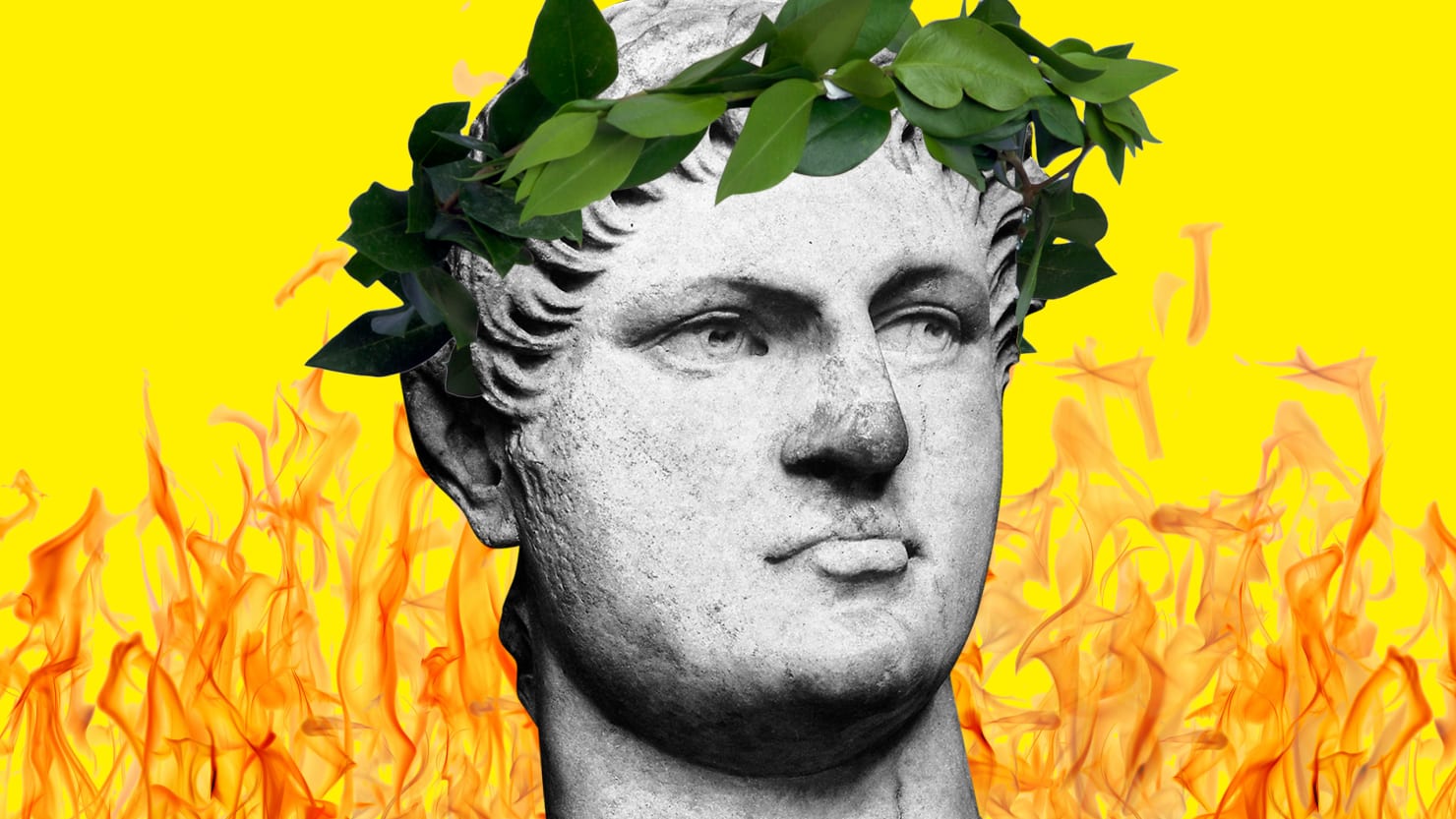Nero, the Execution of Peter and Paul, and the Biggest Fake News in Early Christian History
Christian tradition maintains that after Rome nearly burned to the ground, Nero engaged in a brutal crackdown on Christians which led to the executions of Peter and Paul.

PHOTO ILLUSTRATION BY ELIZABETH BROCKWAY/THE DAILY BEAST
On the evening of July 18, in the scorching summer of 64 CE, a fire started in a shop under the Circus Maximus in Rome. The fire quickly spread to nearby homes and businesses and the Circus itself. The fire burned for six days, ravaging the city. It left only four of Rome’s fourteen quarters untouched.
The reigning emperor, Nero, a man known for his cruelty and love of theater, scapegoated the Christians for the disaster. According to tradition and later historians, as a punishment, Nero devised grotesque executions for the Christians: he covered them in animal skins and had them torn apart by dogs, and he doused them in tar and used them as human torches to light the night sky for his dinner parties. It was in the wake of the fire, Christian tradition maintains, that the most important Apostles–St Peter and St Paul–were arrested and executed. But while the fire of Rome was a devastating historical reality, did Nero actually target Christians as a result?
Most of the historical evidence for Nero persecuting Christians comes to us from the writings of the Roman historian Tacitus, who wrote between 115-120 CE, at least fifty years after the events he was describing. According to Tacitus, the people of Rome blamed Nero for the fire and Nero responded by deflecting blame onto the Christians. He writes, “Nero fastened guilt and inflicted the most exquisite tortures on [the Christians who] were hated for their abominations.” Christians were rounded up, arrested, and interrogated for information about others in the city and, in the end, “an immense multitude” was convicted and executed.
In Roman biographies, Nero is known for murdering his own mother; he is certainly capable of this kind of cruelty, but this does not mean that Tacitus’s story is correct. In his recent Journal of Roman Studies article “The Myth of the Neronian Persecution,” distinguished Princeton classicist Brent Shaw has argued that Tacitus’s story is a later fabrication (full disclosure: I’m inclined to agree with Shaw because I argued something similar in my book Myth of Persecution).
Shaw points out that there are no references to Christians in the writings of any Roman historians prior to Tacitus. Cassius Dio, another Roman historian who discusses the Great Fire, never mentions the Christians at all, and other later Roman sources that do mention the fire are entirely dependent on Tacitus. Suetonius, the only other second-century Roman writer to mention the mistreatment of Christians by Nero, does not connect these punishments with the Great Fire. He says that they were punished for being a “new and evil superstition.”
Perhaps the most devastating piece of evidence is the use of the term “Christian.” The first followers of Jesus were Jews. By the time Tacitus was writing in Asia Minor (modern Turkey) in the second century they had adopted the name Christian and caught the attention of Roman authorities, but it’s not at all clear that Christians thought of themselves or were known as Christians in the 60s. Paul, for example, never uses the word.
As University of Exeter professor David Horrell has shown, the earliest use of the name “Christian” in writing seems to be the biblical book 1 Peter, which was written at the very end of the first century. Some have argued against Shaw that the Acts of the Apostles (the book of the Bible that tells the story of the actions of the apostles after the death of Jesus) states that Christians were first called Christians in Antioch in the 50s. But how accurate is Acts? Clare K. Rothschild, a professor in the Department of Theology at Lewis University, told the The Daily Beast that while “scholars typically date Acts anywhere from 56 to 140 CE… a comprehensive study by the late Richard I. Pervo … has persuaded many that Acts was composed closer to the year 115.” What all of this means, then, is that Christians weren’t Christians in 64 CE. They were Jews. Nero could not possibly have targeted a group that didn’t yet exist.
So what actually happened? Shaw argues that after the fire there were rumors of Nero’s involvement. Nero responded by punishing some arsonists, but these people were not actually Christians, even if they were likely innocent of the charges. In the fifty years that elapsed between the events of 64 CE and the time of Tacitus, those individuals punished by Nero came to be associated with the Christians, because, by the time of Tacitus and Suetonius, Christians were known as trouble makers.
What does this mean, then, for the deaths of Peter and Paul? Well, as I pointed out in Myth of Persecution, the earliest versions of the deaths of Peter and Paul don’t mention the Great Fire at all. In fact it takes centuries to connect the two Apostles to those events. The earliest reference to their deaths (a Christian document called 1 Clement) says that they were executed because of “jealousy.” Several scholars have argued that the word “jealousy” here refers to intra-Christian disputes, meaning that it was because of other church members that Peter and Paul ended up being arrested and killed. Shaw concludes his article by saying that neither the death of Peter nor that of Paul have anything to do with the Great Fire, adding that in both cases their executions had nothing to do with being Christian. He hypothesizes that they were in fact charged with disturbing the peace.
This doesn’t mean of course, that the Great Fire of Rome wasn’t historically significant even beyond the devastating effects of the fire. This is, as Sarah Bond of the University of Iowa has written, an important moment in the history of fire fighting. But much of what we think we know about the fire is the product of legends associated with a tyrannical emperor. To this day people use the expression “fiddled while Rome burned” to refer to Nero’s conduct – but violins wouldn’t be invented until the 11th century, and when the fire broke out he was 35 miles away at his villa. It’s a great turn of phrase, but it’s pretty shoddy history.





ไม่มีความคิดเห็น:
แสดงความคิดเห็น